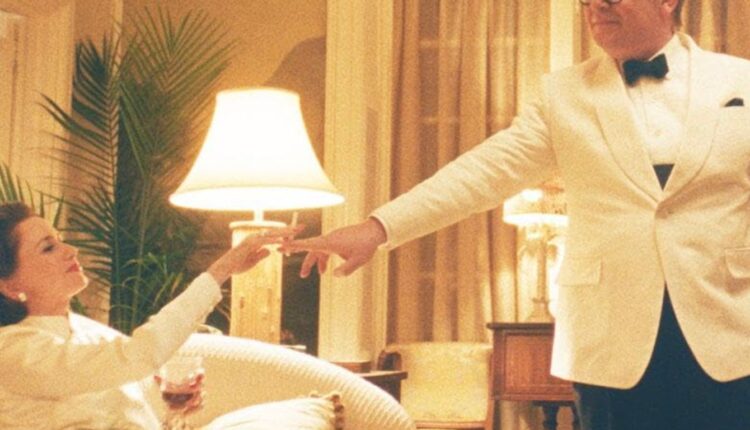‘Feud’ Has Finally Acknowledged the Greatest Tragedy of Truman Capote’s Life
[ad_1]
Should you’re nonetheless watching Feud: Capote vs. the Swans, you then’re most likely expecting the Tom Hollander and Naomi Watts of all of it. This extremely fictionalized sequence misplaced the plot in Episode 2 and settled for vaguely campy, meandering melodrama ( bolstered solely by good appearing and manufacturing design). The shiny camerawork and detailed costuming are actually mere window dressing for Hollander’s wheezy and deeply soulful efficiency as Truman Capote.
Gentle spoiler warning for episodes 1-6 of ‘Feud: Capote vs. The Swans’
That mentioned, Feud has lastly began treating Capote with sympathy. In Episode 6, the present even acknowledged the central tragedy of the celebrated creator’s life – that his outlandish persona finally overshadowed the brilliance of his writing.
It took lengthy sufficient to get right here. Episodes one via 4 of the present appeared extra eager on dragging Capote via the mud than lending any complexity to his titular feud. When the Breakfast at Tiffany’s creator uncovered the lives of his New York socialite associates (the “Swans”) in a tell-all piece for Esquire, Feud introduced it as an act of self-sabotage and desperation. The present then used invention after invention — together with a fictional documentary — to color Capote as egocentric, fame-hungry, and delusional. In mentioned documentary, Capote was seen violating his Swans’ privateness at each flip in his audacious grasp at virality. The caricature was even vicious sufficient to encourage a Slate piece titled, “Why does Feud hate Truman Capote a lot?”
Nevertheless, one in all Capote’s contemporaries at Esquire indicated that Capote didn’t precisely commit the craven act of betrayal Feud described. By publishing the tell-all about his Swans, the person was simply doing his job. “Truman was a author and he was additionally a journalist,” mentioned Capote’s colleague Dotson Rader in an interview with Esquire. “I’ve performed numerous tales and one of many belongings you do while you’re on a narrative on somebody that’s self-protective, you seem like their buddy. That’s the function you play as a journalist, so numerous them get pissed off while you write essential stuff. However that’s your job.”
However why would a person with no attachment to the Swans really feel so wounded by their snubbing of him? Within the present, Capote appeared to enter a downward spiral instantly after the Swans barred him from New York excessive society. So, did Feud suppose that Truman Capote solely cared about getting invited to dinner events? Had the present thus forgotten that he was, above all, a author?
Fortunately, the present dialed again on its Capote-hating in Episode 5 – and reminded us why he grew to become a celebrated author within the first place.
Within the episode, fellow literary nice James Baldwin (an incandescent Chris Chalk) seems thanks to a different invented coincidence by Feud scriptwriter Jon Robin Baitz. In a Magical Negro function, Baldwin heralds the inventive advantage of Capote’s literary tell-all, dubbing it “the firing squad that killed the Romanovs … [the] guillotine that beheaded Marie Antoinette.” The reassurance serves as a call-to-arms for Capote, inspiring him to jot down a complete novel concerning the Swans.
Disregarding the implausibility of such a gathering (in actuality, Capote and Baldwin didn’t appear to like each other much), the literary lovefest does establish Capote’s power as an artist: his social standing. Ever the social outcast, even at his top, Capote has spent his life observing from the sidelines. He has watched as his Swans used homophobic language and handled homosexual males as lap canine; he has stood idly by as they frightened over celebration invites whereas ignoring their lonely kids. Finally, he has performed what any good author would do: He mirrored their world again at them.
Then, in Episode 6, Feud identifies Capote’s best flaw as an artist. By the author’s personal admission in a dialog along with his protegée, he has change into a persona greater than an creator. It’s tragic; it’s honest; it’s indulgent. It’s additionally sadly true for anybody who has studied Capote and located extra descriptions of his outfits, writerly feuds, and boozy speak present appearances than his literary genius. Furthermore, it’s an admission that underlines Feud’s portrayal of Capote as an entire.
All through the present to this point, we’ve seen Capote have interaction in surface-level buffoonery throughout his feud with the Swans. Regardless of the present’s occasional reference to Capote’s in depth, near-immaculate oeuvre, the person comes off principally as a bloated, whiny man-child, outlined not by the empathy and complexity so apparent in his printed writing, however by the exterior signs of his psychological instability. Even his alcoholism isn’t performed for sympathy: It serves extra to villainize him, constructing him up as a debauched monster within the eyes of his family members. (Do the creators of Feud suppose that alcoholics can stop ingesting on the drop of a fedora?)
Nonetheless, the present has a minimum of acknowledged this incongruity in Capote’s life. Plus, there are two episodes remaining. Perhaps Feud will cease pretending that Capote’s writing profession is over and finally present how he printed an acclaimed, record-breaking quick story and essay assortment, Music for Chameleons, earlier than his loss of life. Or, maybe, the on-screen model of the person will display the identical magnanimity and knowledge that he displayed in his terrific quick tales “A Thanksgiving Customer” and “A Christmas Reminiscence.” On the very least, the present may admit that Capote wrote a number of extra chapters of Answered Prayers, his novel-length tell-all concerning the Swans, earlier than he died of alcoholism.
If Feud doesn’t do these items, then it is going to solely have contributed to the central tragedy of Capote’s life. If this simpering, whimpering portrait of the person turns into what he’s most recognized for in future generations, then his larger-than-life persona may have lastly gained the battle.
[ad_2]
Source link

